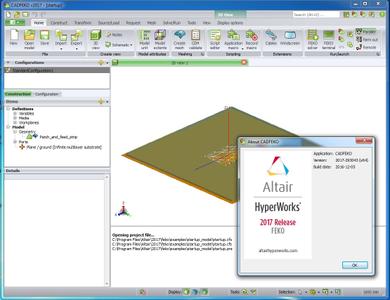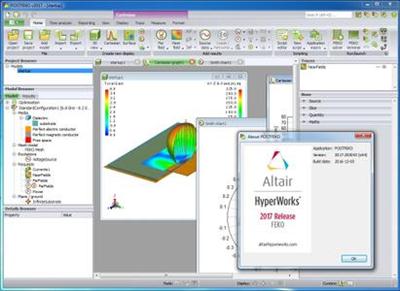
Altair HyperWorks FEKO 2017.0 | 980.0 mb
Altair announced a new release of HyperWorks FEKO 2017, is a comprehensive 3D electromagnetic simulation software suite based on state of the art CEM methods that enable users to solve wide range of EM problems such as antenna design, antenna arrays, antenna placement, RFID, RCS, radomes, pattern synthesis with characteristic mode analysis, EMC/EMI, lightning and cable analysis, Bio-electromagnetics, etc.
FEKO is a comprehensive computational electromagnetics (CEM) software used widely in the telecommunications, automobile, aerospace and defense industries. FEKO offers several frequency and time domain EM solvers under a single license. Hybridization of these methods enables the efficient analysis of a broad spectrum of EM problems, including antennas, microstrip circuits, RF components and biomedical systems, the placement of antennas on electrically large structures, the calculation of scattering as well as the investigation of electromagnetic compatibility (EMC). WinProp is a dedicated tool for wave propagation modeling and radio network planning.
FEKO also offers tools that are tailored to solve more challenging EM interactions, including dedicated solvers for characteristic mode analysis (CMA) and bi-directional cables coupling. Special formulations are also included for efficient simulation of integrated windscreen antennas and antenna arrays.
Combined with the MLFMM, and the true hybridization of the solvers, FEKO is considered the global market leader for antenna placement analysis.
– Introduction to CADFEKO
CADFEKO is the FEKO component that facilitates the creation of CAD geometry using canonical structures and perform boolean operations. It also supports the import and modification of CAD models and meshed geometries. The setting of material properties, solution parameters and the required calculations defined by the user, are all part of the CADFEKO model. If an optimisation search is required, the optimisation parameters and the goal functions can be specified.
– Introduction to POSTFEKO
POSTFEKO is used mainly for two purposes: to validate meshed geometry and to analyse results. Validation of mesh geometry is done so that users can confirm that their models are correct before starting a simulation. This is particularly useful when models are created using EDITFEKO, but is just as relevant for CADFEKO modelling. Analysis of results is the other primary function of POSTFEKO. Once a model has been simulated, POSTFEKO can be used to display and review the results. A variety of tools are available to help visualise data in a constructive manner.
Multiple models, with their geometry (in *.fek files) and results (in *.bof files), can be displayed in a single POSTFEKO project session. The displays are automatically updated each time the model and/or results are updated.Prominent features of FEKO 2017: (Changes since FEKO 14.430)
– The finite difference time domain (FDTD) solver supports OpenMP and MPI parallelisation allowing users to take full advantage of machines with multiple cores and multiple computation nodes in cluster environments.
– The ray launching geometrical optics (RL-GO) solver has been improved considerably in terms of speed and resource efficiency (memory reduction). Innovative algorithms select the most suitable ray distribution and automatically determine when enough ray interactions have been taken into account.
– Improved multilevel fast multipole method (MLFMM) stabilisation allows large problems with intricate detail, that traditionally could have prevented the MLFMM to converge, to be solved.
– 3D anisotropic materials can be modelled using the finite element method (FEM) and FDTD solvers. 3D anisotropic media make it possible to solve circulators and other interesting devices.
– Extensions to the loft operator make the creation of transitions fast and easy. The new loft extensions also provide the user with more control over the loft surface creation.
– A new mesh engine generates improved meshes that often consist of fewer mesh elements that directly relate to a reduction of resources and faster simulation.
– Improvements to the windscreen visualisation allow users to see the layers and their relationship with regards to the active elements. This ensures correct model setup.
– Graphs have been extended with options to add text and shapes that allow improved reporting from within the FEKO interface.Note: For the full list of changes, updates and resolved issues, please refer to the release notes located in the updates folder of your FEKO installation.
About Altair
Altair empowers client innovation and decision-making through technology that optimizes the analysis, management and visualization of business and engineering information. Privately held, with 1,800 employees, Altair has offices throughout North America, South America, Europe and Asia/Pacific. With a 28-year track record for high-end software for engineering and computing, enterprise analytics solutions, and innovative product design and development, Altair consistently delivers a competitive advantage to customers in a broad range of industries.
Product: Altair HyperWorks FEKO 2017
Version: 2017.0 build 293043
Supported Architectures: x64Language: english
System Requirements: PC
Supported Operating Systems: Windows 7even / 8.x / 10

Download Via UploadGIG
http://uploadgig.com/file/download/5b3eBee3A265D218/lyyjn.part1.rar
http://uploadgig.com/file/download/e7165A01d3760cAf/lyyjn.part2.rar
Download Via RapidGator
http://rapidgator.net/file/61464ec42235d18dba3df9a6725e8746/lyyjn.part1.rar.html
http://rapidgator.net/file/b368c514e1748f98cb07f4217393ae51/lyyjn.part2.rar.html






